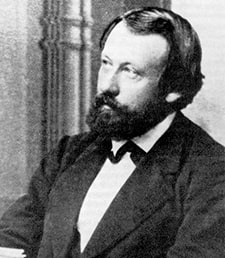Wilhelm Dilthey (1833 – 1911) was a philosopher who wrote about how people use their minds to understand things. Dilthey is known for creating a distinction between the natural and human sciences. The human sciences include both the humanities, which look at things like literature and history, and the social sciences, which study things like politics and sociology.
Dilthey was born into a family of religious scholars. After he finished high school, he began to study theology and philosophy at different universities. He first studied at Heidelberg and then transferred to Berlin, where he studied for a while. After completing exams in theology and philosophy, he taught for some time at secondary schools in Berlin, but soon abandoned this to focus on scholarly pursuits. During these years, he was very active and his investigations led him into different directions. He was interested in both the history of Christianity and the history of philosophy and literature, as well as the emerging sciences of sociology, ethnology, psychology, and physiology.
In 1864, Dilthey completed his doctorate at Berlin University. This allowed him to lecture and teach. He was appointed to a position at the University of Basel in 1866, and two more appointments followed. The first was to the University of Kiel in 1868, and the second was to the University of Breslau in 1871. He was a professor at the University of Berlin for many years and died there in 1982.
Dilthey spent these years working on his research, living a quiet life without any major external excitement. He looked for a philosophical foundation for the sciences that deal with man, society, and the state. He called these fields Geisteswissenschaften (“human sciences”). His book explained some of the things scientists know about the mind. The second volume of his work, which he worked on constantly, never came out. This introductory work led to a series of important essays about cognitive or structural psychology. One of these essays, “Ideas Concerning a Descriptive and Analytical Psychology,” initiated the formation of this type of psychology.
During his last years, Dilthey revised and expanded his work on the structure of the historical world in the human sciences. This work was never finished.


